Walking in The Word and Avoiding Violent Ways

Concerning what people do:
by the words from your lips
I have avoided the ways of the violent.
My steps are on your paths; my feet have not slipped.
-Psalm 17:4-5
Violence is the way of the world.
Violent words and actions.
Stealing and destroying.
Through violence, verbal or physical, we rob others.
David was a warrior. He personally killed lots of people.
But I don't think that is what he is talking about.
These are some questions that come to mind:
What are the paths of the violent?
What are the deeds of men that I want to avoid?
What does God and God's word keep me from?
If I walk with God, what will I avoid?
"The paths of the violent," or, "paths of the destroyer," are the pathways of sin.
To avoid these paths, you have to desire to.
The desire for God is greater than the desire to sin.
To avoid the bad path, we have to make a choice to stay off it.
It doesn't happen automatically.
How to we stay off that bad path?
"By the word of your lips"
God's word.
The word will keep you from sin or sin will keep you from the word.
When temptations come, you have the word that helps you fight it and know what to do.
We're always saying to temptation, "It is written."
"By the word of your lips"
God's word.
The word will keep you from sin or sin will keep you from the word.
When temptations come, you have the word that helps you fight it and know what to do.
We're always saying to temptation, "It is written."
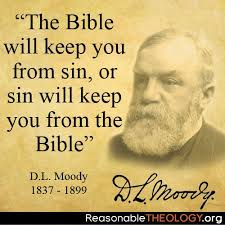
The life of sin is called "the violent path", or "the way of the destroyer".
Sin is destructive.
It is violent in that it robs and destroys.
It is easy to see this with murder or blowing something up, but all sin is corrupting a corrosive.
Sin is when I destroy myself and others.
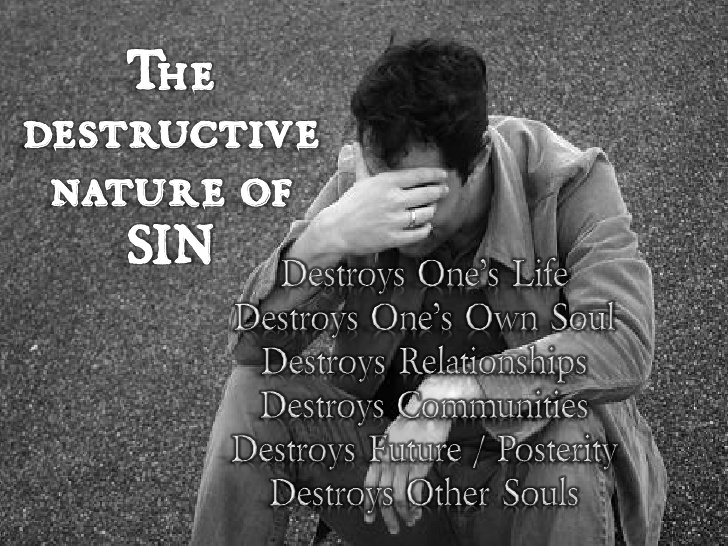
We are imitators, impressionable.
The most widely read devotional book, other than the Bible, is Thomas a Kempis' Imitation of Christ (1418).
Christians are meant to be Christ's disciples: learning to live in him and let him live through us.
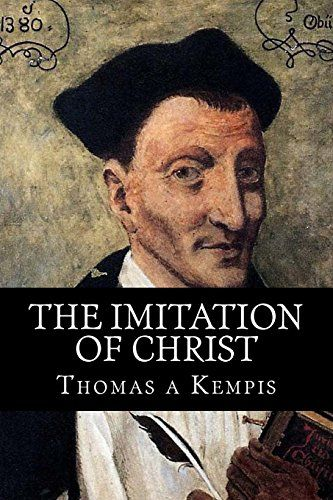
Being a believer is to be in Christ with Christ living through me, taking in his word and walking it out in life.
He is at the center of my life, in control; Lord and King.
And Jesus is called "the Word" (John 1).
The Word keeps us from destructive violent living.
He's the path:
The way, the truth, and the life.
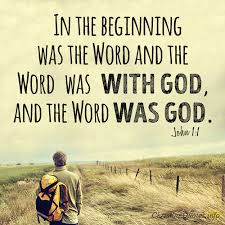
We are to live by God's word and not by lawlessness, destructive, ravenous, pirate-like ways.
To obey and follow what God has said is to avoid becoming a violent tyrant.
Hebrew scholar, exegete, and commentator, Peter Craigie translates Psalm 17:4 like this:
As for the deeds of mankind-
by the word of you lips,
I have kept myself
from robbers' roads.
Peter made this comment, about this verse:
The psalmist has avoided the evil deeds typical of mankind as a whole, which are represented here by one of the most common of violent crimes- robbery. The psalmist affirms that he has kept himself from such evil, but what made it possible was the "word of your lips," namely the divine revelation and guidance. In poetic language, the psalmist avoided "robbers' roads," and similar language continues in v 5 with a contrast: his feet have held firmly to God's "tracks," which suggests a walk of life entirely different from that of wicked persons. This, the poet is utilizing with striking effect a modification of the metaphor of the two ways which was employed in Ps 1; because his feet held firmly to the tracks of God, avoiding the way of the wicked, he could assume the privilege of the righteous of the righteous and pray for vindication.
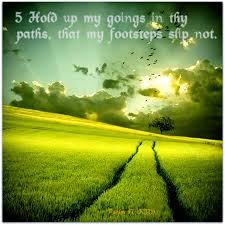
My steps are on your paths; my feet have not slipped.
-Psalm 17:5
Jeremiah Burroughs (1599-1646) was a Puritan independent preacher, who had this written on his study door:
"Opinionum varietas et opinantium unitas non sunt ασυστατα" ("Difference of belief and unity of believers are not inconsistent").He wrote this prayer of David, encapsulating what David was suffering, that might have been the back-story of Psalm 17:
Lord, whatsoever the wrath of Saul be against me, yet let neither that, nor any other thing put me out of thy way, but keep my heart close unto thee, and keep my paths in thy way; let not my footsteps so much as slide from thee, for, Lord, they watch for my halting; if they can find but the least slip from me, they take advantage of it to the utmost; and I am a poor and a weak creature, therefore Lord help me, that my footsteps may not slide.
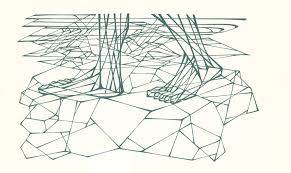
Charles Haddon Spurgeon (1869-85) wrote this, about Psalm 17:
Under trial it is not easy to behave ourselves aright; a candle is not easily kept alight when many envious mouths are puffing at it. In evil times prayer is peculiarly needful, and wise men resort to it at once.
We have a precept here incorporated in an example; if we would be preserved, we must cry to the Preserver, and enlist divine support upon our side. "Hold up my goings" - as a careful driver holds up his horse when going down hill.
We have all sorts of paces, both fast and slow, and the road is never long of one sort, but with God to hold up our goings, nothing in the pace or in the road can cast down.
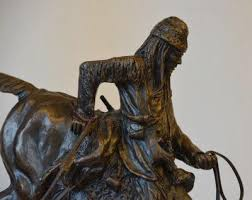
Psalm 17:4-5
The Message:
I’m not trying to get my way in the world’s way. I’m trying to get your way, your Word’s way. I’m staying on your trail; I’m putting one foot In front of the other. I’m not giving up.
The Passion Translation:
Following your word has kept me from wrong.
Your ways have molded my footsteps, keeping me from going down the forbidden paths of the destroyer.
My steps follow in the tracks of your chariot wheels, always staying in their path, never straying from your way.
The Voice:
The path violent men have followed, I will not travel.
Violence is not my way.
Your ways and Your voice now guide my journey.
I will press on—moving steadfastly forward along Your path.
I will not look back. I will not stumble.
Your ways and Your voice now guide my journey.
I will press on—moving steadfastly forward along Your path.
I will not look back. I will not stumble.
New Living Translation:
I have followed your commands, which keep me from following cruel and evil people.
My steps have stayed on your path; I have not wavered from following you.
New International Version:
Though people tried to bribe me, I have kept myself from the ways of the violent through what your lips have commanded.
My steps have held to your paths; my feet have not stumbled.
Comments
Post a Comment